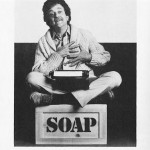George Saunders, a Writing Engineer
Posted on February 28, 2013
Filed Under Communication, The Writing Life | Leave a Comment
Now here’s a writer I want to get to know better. George Saunders has progressed from technical writing to the pages of The New Yorker and, now, his novel, Tenth of December, is No. 3, on The New York Times best seller list for fiction. Not bad for plugging away at saying well what you need to say, either for co-workers or the public.
 Saunders spoke recently at William & Mary College. A press release for that event quoted Junot Diaz, a Pulitzer Prize winner for fiction, as saying of him, “There’s no one who has a better eye for the absurd and dehumanizing parameters of our current culture of capital.”
Saunders spoke recently at William & Mary College. A press release for that event quoted Junot Diaz, a Pulitzer Prize winner for fiction, as saying of him, “There’s no one who has a better eye for the absurd and dehumanizing parameters of our current culture of capital.”
Now, did you ever think that all the quests for approval, after requisite revisions, that technical writers go through, one of them would rise to such an estate – “a better eye for the absurd and dehumanizing parameters” of our times? Just shows where conscientious diligence, and talent, can lead. You don’t want to be thinking absurdity as you walk, say, through a nuclear power plant. But if diligence in a workplace setting leads to skills and insights that spill into best-seller fame, so much the better.
Read more
State-of-the-Art Technical Formatting (When You’re Not Stuffed Into Protective Gear)
Posted on February 20, 2013
Filed Under Technology, The Writing Life | Leave a Comment
 Here’s an interesting slide presentation by an Adobe Systems Inc. manager, Saibal Bhaattacharjee, on “Key Trends in Technical Communication.” It was presented at the recent MEGAComm annual conference.
Here’s an interesting slide presentation by an Adobe Systems Inc. manager, Saibal Bhaattacharjee, on “Key Trends in Technical Communication.” It was presented at the recent MEGAComm annual conference.
In a way, calling attention to the latest tech writing techniques shows how broadminded Encore is. That’s because Dennis Owen, our principal, works primarily on procedures for nuclear power plants, where new technologies don’t take hold nearly so fast as elsewhere. And that’s fully understandable.
“You can’t even get a wireless signal for your iPad in most parts of a (nuclear) plant,” Dennis notes. “Indeed, plants don’t even want wireless devices because some plant equipment is sensitive to RF. And sometimes when you are in two layers of protective clothing and wearing a respirator while crawling around pipes and equipment, a paper procedure stuffed into you pocket is hard to beat.” Formatting for conditions, you might say.
Read more
An Online Tech Writing Hangout
Posted on February 13, 2013
Filed Under Communication, The Writing Life | Leave a Comment
Here’s a promising site for technical writers to hang out on and perhaps enhance their skills – TechWhirl, at its Technical Writing tab. Its headings include Education Center, Upcoming Events, Industry News and Tech Writer Today Articles. There are also links to Content Management Industry, Technical Writing, Content Management Systems and Content Production.
TechWhirl looks like a site for keeping current with what’s going on in the technical writing and content management world. – Doug Bedell
You Can’t Say Much With the Most Used Words
Posted on February 4, 2013
Filed Under Communication, The Writing Life | Leave a Comment
Technical writers are always being urged to take the time to be clearly understood. And that’s a noble aim. But if it should mean writing only in the most commonly used words, the first thousand of them, no more, it probably can’t be done. “Thousand,” itself, is not one of the “ten hundred most common words.” How do we know that, what kind of quirky excursion have we been on this time?
 Well, we came upon the Up-Goer Five Text Editor. Phys.org notes that it’s been written by Theo Sanderson, a geneticist, after a comic strip named to describe the Saturn V rocket (“rocket” isn’t one of the ten-hundred words either). Having come upon the free editor, bloggers Chris Rowan and Anne Jefferson set up a Tumblr blogger page called Ten Hundred Words of Science. Phys.org advises that “they’re asking scientists to describe what they do for a living using Sanderson’s text editor. The results are thought provoking, interesting and quite often humorous.”
Well, we came upon the Up-Goer Five Text Editor. Phys.org notes that it’s been written by Theo Sanderson, a geneticist, after a comic strip named to describe the Saturn V rocket (“rocket” isn’t one of the ten-hundred words either). Having come upon the free editor, bloggers Chris Rowan and Anne Jefferson set up a Tumblr blogger page called Ten Hundred Words of Science. Phys.org advises that “they’re asking scientists to describe what they do for a living using Sanderson’s text editor. The results are thought provoking, interesting and quite often humorous.”
So give it a try yourself. The value of your effort will likely be greater appreciation for the bundling of our most common words – and how children learn by using them. We gave it a try and came up with an impromptu thumbnail essay on spartan expression:
“Well, now, here we’re going to try something that will be hard for most of you – in fact, not possible.
Read more
Kurt Vonnegut’s Rules for Writing – Technical or Otherwise
Posted on January 28, 2013
Filed Under Communication, The Writing Life | Leave a Comment
Here’s some instructive material we’ve come across from the late Kurt Vonnegut, a great fiction writer who, herein, aims a glancing blow at newspaper reporters and technical writers, but is nonetheless instructive to us all.
 “Newspaper reporters and technical writers,” Vonnegut (who died in 2007) wrote, “are trained to reveal almost nothing about themselves in their writing. This makes them freaks in the world of writers, since almost all of the other ink-stained wretches in that world reveal a lot about themselves to readers. We call these revelations, accidental and intentional, elements of style….”
“Newspaper reporters and technical writers,” Vonnegut (who died in 2007) wrote, “are trained to reveal almost nothing about themselves in their writing. This makes them freaks in the world of writers, since almost all of the other ink-stained wretches in that world reveal a lot about themselves to readers. We call these revelations, accidental and intentional, elements of style….”
True enough, technical writers are providing descriptions of processes, not freer-form narratives. Yet several of Vonnegut’s “rules for great writing” seem applicable to technical writers, too.
Read more
Tech Writing Seas to Sail
Posted on January 19, 2013
Filed Under The Writing Life | Leave a Comment
Today is Technical Writing Resource Day on Insights! First, here’s a distillation from Tom Johnson’s “I’d Rather Be Writing” blog of the “Top 10 Most Frequently Asked Qustions about Technical Writing.” Not all will be your top needs or areas of interest, but some are likely to be helpful.
 Not everyone, for example, is doing tech writing for web publication, but a growing number likely are, so authoring tools like Madcap Flare and InDesign are good to be familiar with. (Both can be used for print publication, as well.) Some of the other topics are for amateurs thinking of turning pro. All are for writers who’d like more familiarity with the field. In the process of answering them, Tom provides a good overview of technical writing itself.
Not everyone, for example, is doing tech writing for web publication, but a growing number likely are, so authoring tools like Madcap Flare and InDesign are good to be familiar with. (Both can be used for print publication, as well.) Some of the other topics are for amateurs thinking of turning pro. All are for writers who’d like more familiarity with the field. In the process of answering them, Tom provides a good overview of technical writing itself.
Next, Nicky Bleiel, with 18 years experience in technical writing, presents an introductory video on the craft, the first of a series she has available. Nicky is “Lead Information Developer” for Doc-to-Help, a service that seeks to be pertinent to technical writers.
We could go on, but we’re not in your shoes, so we’ll stop by offering these few paths for exploring tech writing approaches that are readily at hand. Here’s to clarity for all! – Doug Bedell
Technical Writing as a ‘Newsbeat’ of Old
Posted on January 8, 2013
Filed Under Business, Communication, Technology, The Writing Life | Leave a Comment
It struck us recently that technical writing is a lot like covering a newspaper beat, which we did many years ago. Only now you don’t need to leave your desk and computer screen. Then, you had to pop on a telephone headset or hop in you car and head for wherever your latest story might be unfolding.
 These reminiscent thoughts occurred on happening upon on an article, “How to Master Technical Writing,” on the eHow website. We once covered the police beat, then the labor beat, for a big metropolitan daily. The labor beat began evolving primarily from covering labor unions to workplaces, and worklife, in general. And that’s when the parallel with technical writing becomes most apt.
These reminiscent thoughts occurred on happening upon on an article, “How to Master Technical Writing,” on the eHow website. We once covered the police beat, then the labor beat, for a big metropolitan daily. The labor beat began evolving primarily from covering labor unions to workplaces, and worklife, in general. And that’s when the parallel with technical writing becomes most apt.
“Understand proper technical writing format” goes almost without saying, but it heads eHow’s list. You need to know who you’re writing for (Point No. 2) and what their expectations are. There’s a difference between reporting for a family newspaper (which ours was) and a tabloid (the competition). You need to be clear on your readers’ expectations. Basically, we suspect, they’re involve accuracy and pertinence to workaday needs or aspirations.
Read more
Tech Resolves for the New Year
Posted on January 2, 2013
Filed Under Technology, The Writing Life | Leave a Comment
We all know we’re going to do things better in this new year, with more value added. But what does that involve in technical writing terms? Basically to be sharper and more coherent . But specifically? Well, the Gryphon Mountain Journals blog offers “Ten New Year’s Resolutions for Technical Writers.”
 Some of the resolves are idiosyncratic, “a physiological or temperamental peculiarity” (according to the American Heritage Dictionary). But others have undoubted utility. For instance, it wouldn’t hurt to “finally learn what DITA stands for” (“Darwin Information Typing Architecture” says Wikipedia, but that’s only the start of the story). Or it couldn’t hurt to “read the Society for Technical Communication’s bylaws.” That might introduce you to a community that would ease your feeling of being a loner up against the boss.
Some of the resolves are idiosyncratic, “a physiological or temperamental peculiarity” (according to the American Heritage Dictionary). But others have undoubted utility. For instance, it wouldn’t hurt to “finally learn what DITA stands for” (“Darwin Information Typing Architecture” says Wikipedia, but that’s only the start of the story). Or it couldn’t hurt to “read the Society for Technical Communication’s bylaws.” That might introduce you to a community that would ease your feeling of being a loner up against the boss.
“Find a professional conference that costs less than the bill for your car’s transmission replacement” might not be possible, even though it’s a worthy objective.
Read more
Writing To Be Read? Let’s Hope It Works
Posted on December 19, 2012
Filed Under Communication, Technology, The Writing Life | Leave a Comment
Oh dear, an august research paper reports that, at least when it comes to computers, people don’t read their manuals. “The median proportion of the times that participants reported solving problems with computer applications by using printed manuals was 0 percent,” the paper’s authors, David G. Novick and Karen Ward, advise.
Computer users reported they were as likely to ask for someone’s help as to read even online help.
 That’s hardly an endorsement of technical writing in the computer biz, at any rate. But when you think about it, computer manuals should be among the most accessible examples of technical writing. They’re presumably written for a mass audience. Computer users aren’t required to read their manuals, but they don’t consult them anyway. Where does that leave technical writers? If we’re not required reading, will we have any readers? And if we are required, will we be read closely enough?
That’s hardly an endorsement of technical writing in the computer biz, at any rate. But when you think about it, computer manuals should be among the most accessible examples of technical writing. They’re presumably written for a mass audience. Computer users aren’t required to read their manuals, but they don’t consult them anyway. Where does that leave technical writers? If we’re not required reading, will we have any readers? And if we are required, will we be read closely enough?
The stakes can be pretty high here, even if a tech writer’s readers aren’t working in a nuclear power plant or a hospital. You want processes and procedures to be taken seriously, to be absorbed by their users. That’s a prime reason for writing them out.
Read more
Good Tech Writers Set Their Own Lean Limits
Posted on December 15, 2012
Filed Under Business, Technology, The Writing Life | Leave a Comment
Writers need readers or their writing may not exist. Unless you’re a diarist or a personal blogger, you want assurance that someone will be reading your work. Technical writing has a leg up in that regard. You won’t be writing unless you have a setting or a process to describe – a specific purpose is built into your output.
 Okay. But what if you’re writing for a publisher with strict formatting requirements? Could that seriously cramp your style? Might a template or word limit deflect your motivation for even getting started? It certainly could, Jeffrey Way, editor of the Nettuts+ blog confirms. Potential publishers shouldn’t be setting limits on technical writers if they can possibly avoid them. (That’s assuming, of course, given writers are orderly and efficient in the first place. But what competent technical writer wouldn’t be?)
Okay. But what if you’re writing for a publisher with strict formatting requirements? Could that seriously cramp your style? Might a template or word limit deflect your motivation for even getting started? It certainly could, Jeffrey Way, editor of the Nettuts+ blog confirms. Potential publishers shouldn’t be setting limits on technical writers if they can possibly avoid them. (That’s assuming, of course, given writers are orderly and efficient in the first place. But what competent technical writer wouldn’t be?)
For a while, Way had word count and formatting requirements for Nettuts+, but he dropped them.
Read more
Recently
- Presentations With Forethought
- Technical Writing’s Lineage – Surely It’s Deeper than Digital
- At the Holidays, Twitting Amazon
- Successful Cookie Baking – From Mom, an Acknowledged Expert
- Slides for a Tech Writer’s Craft
- Digital or Not, Be Clear
- Being Watchful About Digital Designs…
- When Proposals Don’t Click, Keep Making Them Anyway
- Like a Good Gardener, Help an Enterprise Keep Itself Current
- We’re Leaders All, And Need to Think That Way
Categories
Archives
- January 2017
- December 2016
- November 2016
- October 2016
- September 2016
- August 2016
- July 2016
- June 2016
- May 2016
- April 2016
- March 2016
- February 2016
- January 2016
- December 2015
- November 2015
- October 2015
- September 2015
- August 2015
- July 2015
- June 2015
- May 2015
- April 2015
- March 2015
- February 2015
- January 2015
- December 2014
- November 2014
- October 2014
- March 2014
- February 2014
- January 2014
- December 2013
- November 2013
- October 2013
- September 2013
- August 2013
- July 2013
- June 2013
- May 2013
- April 2013
- March 2013
- February 2013
- January 2013
- December 2012
- November 2012
- October 2012
- September 2012
- August 2012
- July 2012
- June 2012
- May 2012
- April 2012
- March 2012
- February 2012
- January 2012
- December 2011
- November 2011
- October 2011
- September 2011
- August 2011
- July 2011
- June 2011
- May 2011
- April 2011
- March 2011
- February 2011
- January 2011
- December 2010
- November 2010
- October 2010
- September 2010
- August 2010
- July 2010
- June 2010
- May 2010
- April 2010
- March 2010
- February 2010
- January 2010